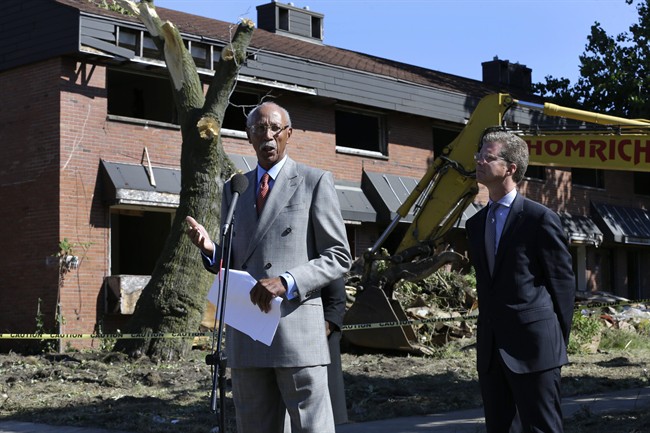DETROIT – City and federal officials made good on promises Wednesday to start work on razing a vacant Detroit housing project once home to boxer Joe Louis and the Supremes before the musical trio became vital voices of “the Motown sound.”

Crews began to encircle the site of the former Frederick Douglass Homes, the graffiti-covered complex comprising several city blocks. Better known as the Brewster projects, the complex have become a persistent, prominent symbol of abandonment and decay in a once-vital manufacturing city searching for its financial footing and larger recovery after decades of job and population losses.
For Detroit Mayor Dave Bing, the tear-down offers the chance to hit the reset button on what could be a valuable swath of real estate near the downtown of a city that recently became the largest in the nation to file for bankruptcy. A $6.5 million emergency federal grant covers the initial phase of demolition and more could come for the rest of the work.
Bing acknowledged the Brewster’s lore as the proving grounds for Diana Ross, Florence Ballard and Mary Wilson before joining Motown Records a half-century ago as well as the training ground for Louis, who trained at the nearby Brewster-Wheeler Recreation Center. The city also said the complex, abandoned in 2008, was the nation’s first federally funded housing development for African-Americans when it opened in 1935.

Get breaking National news
Still, history can’t erase current reality: The buildings on the edge of downtown have become a haven for crime and arson, as well as an “eyesore on our city’s landscape,” he said.
Bing said he expects “a lot of developers” will look at the 18.5-acre (7-hectare) property even before the city issues requests for proposals. The area sits between the city’s rebounding Midtown and downtown areas, and near the proposed $650 million development that includes a new arena for the Detroit Red Wings ice hockey team.
Work began on the complex’s low-rise row houses, and the mid- and high-rise structures are expected to follow later this year.

Comments